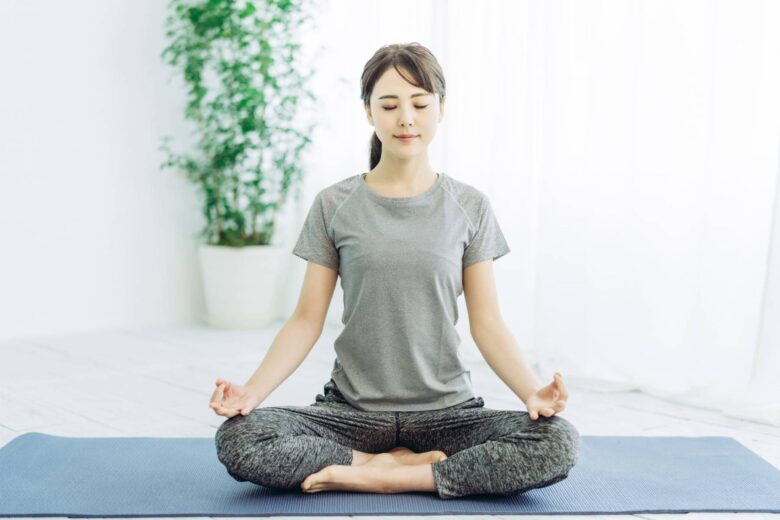Meditation has long been advocated as an effective means to soothe emotions and ease physical discomfort, with numerous health organizations, including Mayo Clinic doctors, hailing it as an easy practice that does not require special equipment to start.
Different forms of meditation include guided imagery, tai chi and yoga – each involves relaxing the body while focusing on breathing deeply.
1. Reduces Stress
With stress levels rising due to health concerns, rising gas and food costs, global political strife and everyday pressures of life being so high, anxiety and depression have become commonplace. Meditation may help find peace within yourself while decreasing risk factors associated with disease as well as improving overall well-being.
Meditation has been shown to reduce physiological markers of stress like cortisol, blood pressure and heart rate as well as lipids like triglycerides. Furthermore, studies show that meditation enhances immune function and inflammatory responses by decreasing cytokines. Furthermore, research also shows how meditation may slow chronic illness such as cardiovascular disease, hypertension diabetes or fibromyalgia by slowing its progress.
Meditation can be an easy and effective way to help reduce stress at home, without needing special equipment. Anyone from beginners to experts alike can participate in this form of relaxation practice, making meditation accessible and feasible. Just keep in mind that it shouldn’t replace medical treatments or lifestyle changes; rather it should serve as an adjunct. If you have any queries about its benefits speak with your physician.
2. Improves Sleep
Meditation is an effective relaxation practice designed to lower both your heart rate and blood pressure, helping prevent strokes and heart disease as well as improving sleep and increasing concentration power. Meditation also enhances sleep quality and can improve focus during concentration tasks.
Meditation helps develop willpower and regulate negative emotions such as anxiety, depression and PTSD, while helping manage pain better when combined with medical treatments.
Meditation also strengthens your immune system. It reduces chronic inflammation that contributes to auto-immune diseases like rheumatoid arthritis, psoriasis and lupus and increases telomere length – proteins which protect chromosomes that shorten with age resulting in cells dying off and your body losing the capacity to fight infections – studies published in Psychosomatic Medicine have demonstrated this benefit and show frequent meditators have longer telomeres than non-mediators.
3. Reduces Anxiety
Stress is one of the leading contributors to conditions like asthma, high blood pressure, heart disease, diabetes and depression. Meditation can help mitigate its effects by reducing chronic inflammation and strengthening immune systems – increasing your ability to defend yourself against acute threats more efficiently.
Meditation can also be an effective tool in relieving anxiety. Meditation works by breaking down the link between “me” and “fear centers”, helping you recognize when negative thoughts surface, as well as realizing they don’t define who you are despite how they may impact on you.
Meditation can be practiced in various forms, including mindfulness, visual-based, breathing or mantra meditations. No matter which form is chosen for practice, all offer positive health advantages – for instance mindfulness meditation has been proven to improve cardiovascular health while insight meditation increases telomere length and loving-kindness meditation fosters compassion. Studies have revealed that meditators tend to produce more antibodies in their bloodstream to fight illness and infection and even have stronger responses after receiving flu shots – offering long-lasting immune boosting properties of meditation practice.
4. Increases Self-Awareness
Meditation may seem like just another means of relaxing the mind, but research shows it can also have beneficial physical consequences. Studies indicate that regular meditation practice can lower blood pressure, ease chronic back pain and possibly help stave off Alzheimer’s disease.
Meditation helps increase awareness of one’s thoughts and feelings, so as to decrease negative responses in stressful situations – something particularly crucial for people living with anxiety, depression or other mental health conditions.
Meditation helps your brain activity and heart rate to slow, while simultaneously increasing the size of your hippocampus – an area responsible for memory. Researches have discovered that people suffering from chronic depression tend to have smaller hippocampuses.
No matter the method you use to meditate – breathing deeply, repeating mantras or following guided meditations – all forms of meditation offer significant health advantages. Mindfulness meditation improves vascular health and heart rates while insight meditation boosts telomere length while loving-kindness meditation decreases chronic pain. Furthermore, these practices strengthen our immune systems by decreasing pro-inflammatory chemicals called cytokines while strengthening innate immunity.
5. Reduces Pain
Meditation can help people overcome mental health issues such as depression and anxiety while simultaneously raising self-esteem. Many report improved sleep and decreased high blood pressure as a result. Some even find that regular meditation helps manage substance abuse disorder or reduce dementia risks.
Physical wellness benefits from regular meditation include reduction of chronic back pain and other conditions. Meditation also has an incredible positive effect on our immune systems by decreasing production of proinflammatory chemicals known as cytokines while slowing telomere shortening, thus decreasing cell death rates.
Regular mediation has also been associated with improved coordination, flexibility and balance for its practitioners. A 2014 study demonstrated that meditation led to higher levels of telomerase enzyme – an enzyme which prevents the breakdown of chromosomes that may help slow aging – among meditators than other groups; additional benefits have included reduced symptoms of depression and anxiety as well as greater feelings of compassion towards others.



